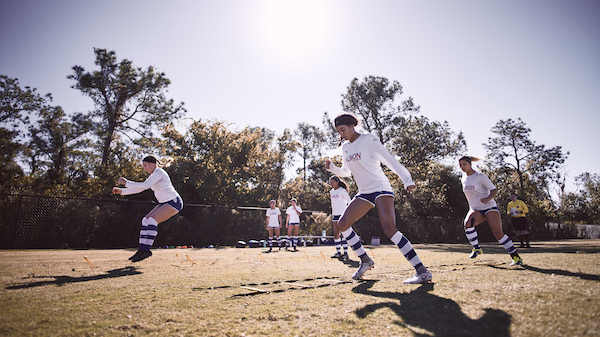Stack: How to Create Your Personal Recruiting Platform

Chris Stack, Founder of Guiding Future Stars, author of the College Recruiting Playbook, and developer of the Designing Your Pathway to College Curriculum is a an expert in college recruiting education. GFS is committed to EDUCATE prospective student-athletes, parents, and coaches about what it takes to play at the next level, how the college recruiting process works, and how to be a successful student-athlete who excels in the classroom, on the field, and in the community.
——–
The college recruiting process has drastically changed over the last decade. Verbal commitments have been trending earlier and earlier and social media has altered how prospective student-athletes market and promote themselves to college coaches. It is safe to say that every high school students utilizes some form of social media platform whether it be Instagram, YouTube, Twitter, Facebook, or Snap Chat.
The days of paying a recruiting or scouting service thousands of dollars are not necessary anymore. There are plenty of tools, resources, and information to help you navigate through the process and be recruited successfully. One of those tools is your own Social Media Platforms.
Use Social Media to Enhance your Personal Brand
Your social media platforms should be an extension of who you are as a student, an athlete, and as a person. If you are not representing yourself in positive manner than college coaches simply will not recruit you. You must learn how to utilize social media to help you in your journey to play college soccer.
- Name/Handle: First things first make sure it is an appropriate name. Second, make sure a coach can recognize you. Include part of your name, graduation year, and/or number. Try and Be Consistent across all platforms (e.g CJStack2019)
- Content: The content (pictures, comments, etc) you post should be appropriate. If you weren’t comfortable saying it/showing it to your parents and grandparents, then you probably shouldn’t publish it on social media.
- Representation: Keep in mind as a student-athlete you not only represent yourself, but your family, your school, your team, and your coach. What you post could effect them in the long run.
- Keep your Posts/Tweets Clean! Avoid using profanity or any derogatory comments about a person or group of people.
- I know you would never violate any rules or break any laws, but in the unlikely event you do, don’t publicize it! There are countless stories of athletic scholarship opportunities lost and careers ended by tweeting incriminating info.
- Do not tweet about being in “grind mode” or tell the world how hard you are working on the field or in the gym, because if you were really working that hard, you would not have time to tell us about it!
- Never tweet about controversial topics including politics, race, religion or sexual orientation. Nothing good ever comes from those tweets and they tend to go viral quickly. Just don’t do it!
- Be extra cautious about posting after a tough loss. A good rule would be to sleep on it. They can be difficult and emotionally draining and you might regret what you tweet. Let’s use the Hope Solo incident. Her words resulted in a 6 month suspension from the US Women’s National Team and was recently allowed a leave of absence from the Seattle Reign.

- Never reply to or retweet things from users with vulgar names or say vulgar things. When you retweet those things it is like you were saying it yourself. Further, do you really want to be associated with @filthypanties, @BigAssBarb or @turdfarts
- If you are underage you should not be drinking. Never allow yourself to be photographed with a drink or red cup in your hand. We all know what goes in those red cups and even if you were drinking water, nobody is going to believe you.
- Social Media is a personal timeline. If you missed a class, meeting, or other event and you posted during those times most likely you are gonna get caught in a lie.
Social Media can either help or hinder your recruitment to the college of your choice, make sure its the former.
How to Use Your Social Media as Your Personal Recruiting Platform
Social Media allows you to easily share and send information, articles, and videos. So why not use that as opportunity to market yourself to college coaches. Student-Athletes can share and interact with schools, programs, and even coaches as they navigate through the process.
Twitter: Your twitter account can be the perfect platform to promote and market your academic and athletic abilities. If you have a Student-Athlete Profile document you can pin that to the top of your profile. Anytime someone visits your page , your SA profile is the first thing that they see. Do you have a recruiting video, post that to your page. Have you received any honors or achievements both on and off the field let the world know.
Check out our video How to Use Twitter as Your Recruiting Profile
Facebook: If you have a Facebook Account, go ahead and create a Facebook Page (e.g Chris Stack 2019) Similar to your Twitter page add photos, images, and videos. You can add links of upcoming schedules and events you will be participating in.
Instagram: Insta is slightly different than Twitter and Facebook because it is really limited to pictures and videos that you can post. Do you have an Elevator Pitch. If not, you should develop one and video you it and post and share. 30 second video of who you are and what you are looking for in your college experience.
YouTube: Do you have a YouTube Account? This can be a great place to posts and share your recruiting videos. The videos don’t always have to be your athletic videos but you can share things about whats going on in school or something about a community service project you are working on. Try and let college coaches into your world. The more they know about you outside of soccer the more likely they are to recruit you.
Creating your own Personal Blog
Are you looking for a creative way to tell your story to college coaches then start your own personal blog. What better way to tell your story than writing about it for coaches to read. A blog is an excellent and innovative way for prospective student-athletes to gain college exposure. In order to be recruited college coaches need to know who you are. And your blog can tell them that story.
How easy is it to start a blog? In 5 minutes you can set up a FREE personal recruiting blog on wordpress and start writing your first article. What do you want college coaches to know about you? What kind of student, athlete, and person are you? What are your goals? What are your core values? What is most important to you in your life?
Why Blog?
One of the first things college coaches /recruiting coordinators do when information about new prospect comes across their desk is google them. What shows up when you google yourself? By creating your own personal recruiting platform using a consistent name (e.g CJStack2019) across all your social media platforms these will show up first in a google search.
What to Blog About
Your options are limitless when it comes to things to write about. You want to focus on ideas that will maximize your recruiting exposure. Don’t blog about your day to day routine but rather bigger life events.
- Bio of who you are as a student-athlete
- Recent/Upcoming/Past Athletic Performances (Game, Showcase, etc)
- How you prepare for competition?
- Honors / Achievements (Academic or Athletic)
- Discuss your goals? Your Why?
- Talk about things your involved outside of soccer? Why?
- Community Service Initiatives
- Moments where you had to battle adversity
- Times when you were overwhelmed and how you dealt with it.
- Attending a College ID/Camp Clinic
- Experience on Campus Visits
Obviously, this shouldn’t need to be said but make sure what you are writing is the truth and not a made up story of things that coaches want to read and know about a prospect. COACHES ALWAYS FIND OUT THE TRUTH
The Keys to Writing a Good Recruiting Blog
- A Blog Title that Stands Out – e.g Stacks 2 Goals Propel the Explorers to PCL Final
- Quality Writing (Interesting Topics & Proofread)
SOCCERWIRE MARKETPLACE
- The St. James FC Travel Staff Coach - North (Loudoun) & South (Fairfax)
- The St. James FC Girls Academy (GA) Head Coach - 2 teams
- The St James FC Boys Travel Tryouts
- OFFICIAL BAYERN MUNICH SUMMER CAMPS U.S.
- JOIN THE ALLIANCE!
- OFFICIAL FC BARCELONA CAMPS U.S.
- The Cup San Diego - Hosted by Legends FC
- Players Wanted - Undergraduate or Post-graduate
- Head Coach - South Region at The St. James FC
- Travel Coach - North Region at The St. James FC











